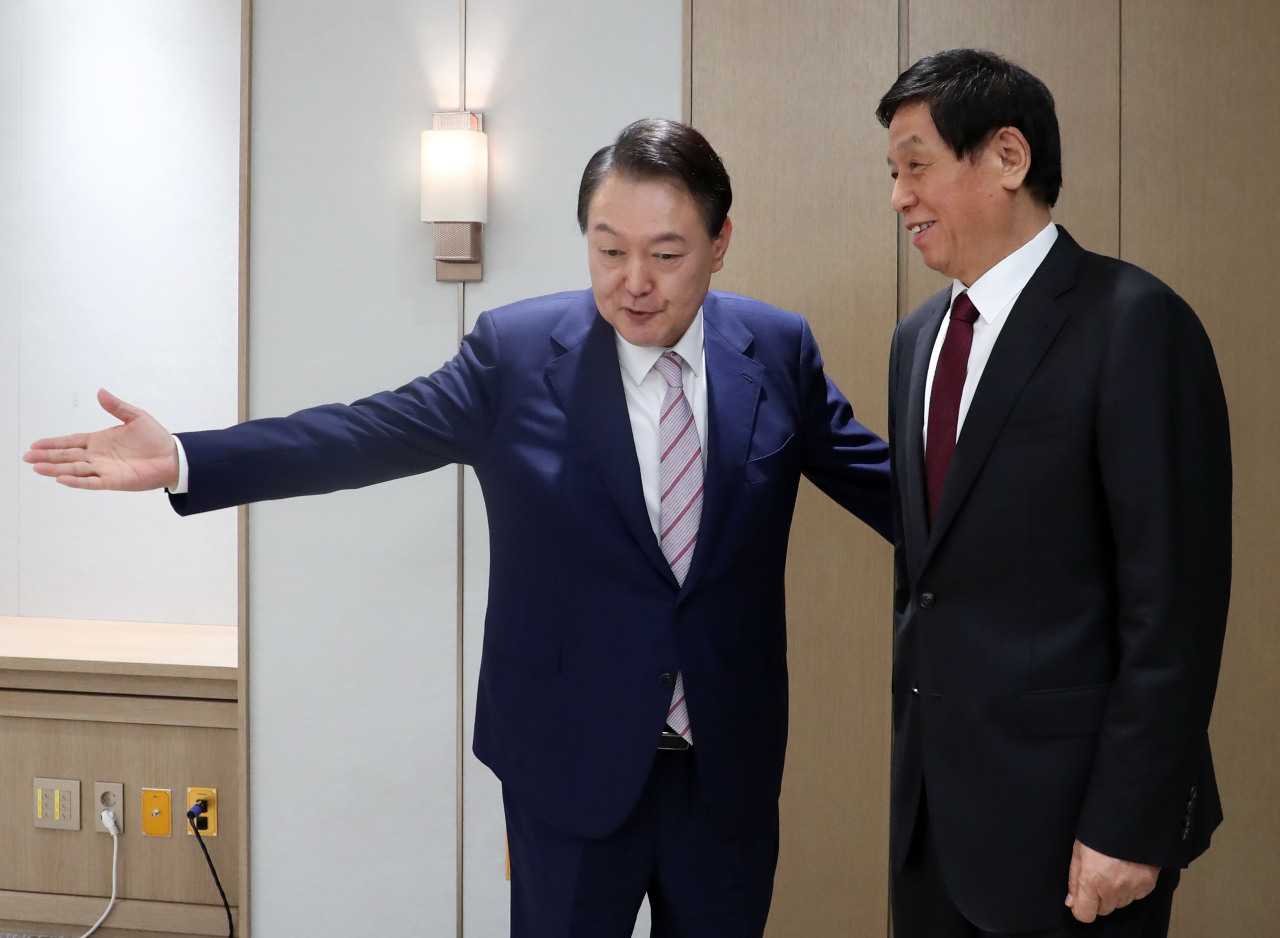 |
South Korean President Yoon Suk-yeol welcomes Li Zhanshu, Beijing’s third-highest-ranking official and chief of the Standing Committee of the National People’s Congress, who is paying a courtesy call, at the presidential office in Seoul on Friday. (Yonhap) |
Li Zhanshu, Beijing’s third-highest-ranking official and chief of the Standing Committee of the National People’s Congress, made an unprecedented two-day trip to Seoul from Thursday, as South Korea has embarked on work to normalize operations of the Terminal High Altitude Area Defense anti-missile system.
Paying a courtesy visit to South Korean President Yoon Suk-yeol and also meeting with top officials including his Korean counterpart Kim Jin-pyo, the National Assembly speaker, Li discussed a range of topics, including the operation of THAAD.
When Li visited on Friday, Yoon told Li that South Korea and China must "closely communicate" so that THAAD does not become a "hurdle" to bilateral relations.
Li also agreed on the need for improvement in communication to address the "sensitive" issue, implicitly referring to the THAAD issue.
South Korea and China have been at odds over Seoul’s deployment of the US-made anti-missile system since 2017. While South Korea maintains that its deployment of THAAD is to counter North Korean aggression, China has claimed the deployment is a US attempt to undermine its security.
In a meeting of foreign ministers last month, the top envoys of the neighboring countries made counterarguments over the THAAD deployment, as China demanded South Korea keep to its promise of "Three Nos and One Restriction" policy to refrain from using the US-made anti-missile system.
South Korean Foreign Minister Park Jin countered his Chinese counterpart Wang Yi’s claim, saying the "Three Nos" policy is neither an agreement made between the two countries nor Korea’s official policy, but the political stance of a predecessor.
The “Three Nos” approach was undertaken by the Moon Jae-in administration to resolve frayed ties with China, which restricted economic and tourist exchanges in retaliation to Seoul’s installment of the THAAD system in 2017. The addition of “One Restriction” appears to refer to the then-government’s decision to not operate the THAAD system.
Over Li’s visit to Seoul and his meeting with Yoon, China’s state-operated English news outlet Global Times cited analysts to report that Seoul appears to have "received and better understood Beijing’s position on some sensitive issues, and that following the US is not completely in South Korea’s national interests."
In the meeting with Li, Yoon also delivered his invitation for Chinese President Xi Jinping to Seoul, saying that Xi’s visit would be an "important sign" that opens the door to the next 30 years of their bilateral relationship.
South Korea and China celebrate the 30th anniversary of the establishment of their diplomatic relations this year.
With the ongoing THAAD issue, however, it is highly unlikely for Xi to visit Korea anytime soon, unless there is a clear benefit for China to gain, Kang Jun-young, a Chinese studies professor at Hankuk University of Foreign Studies, told The Korea Herald.
Li traveled to Seoul with an entourage of 66, upon the invitation of South Korea’s National Assembly Speaker Kim Jin-pyo.
By Jo He-rim (herim@heraldcorp.com)







